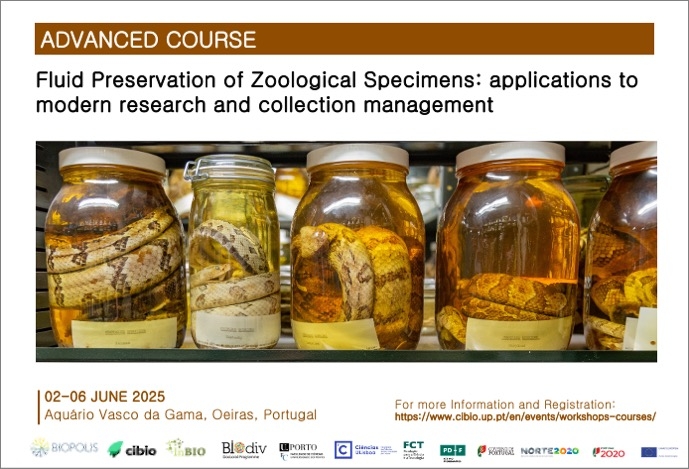Fluid preservation is one of the best ways to preserve zoological specimens for biological research. This intensive course will introduce fluid preservation techniques and how to conserve and manage such specimens/collections. The course will cover the basics of specimen-based research, history of fluid preservation, best practices on collecting and fixing, conservation and management of fluid preserved specimens/collections, ethics and legislation, challenges associated to fluid preserved collections, and modern use of fluid preserved specimens for research (extended-specimen concept; museomics; etc). The course will include practical training on both collecting, fixing, conservation and collection management. This course is intended for researchers, students, and museum specialists.
PROGRAM
Day 1
9.00 – 9.15
Welcome to the participants and delivery of the course material (Director of the Aquário Vasco da Gama)
9.15 – 10.15
What is a scientific specimen? The epistemological nature of specimens, its layers of data, and uses in biological research. The importance of type specimens for taxonomic and nomenclatural purposes.
Specimen-based research A brief introduction to the different ways specimens are used in research.
10.30 – 12.30
The basic of fluid preservation An overview of what fluid preservation is, its main concepts and methods
History of fluid preservation A historical overview on the 350 years of fluid preservation, with an emphasis on the history of fluid preservation in Portuguese natural history collections since the eighteenth century
12.30 – 14.00 Lunch break
14.00 – 17.30
Fieldwork and collecting A review of the most common techniques used to collect new specimens in the field.
Ethics and legislation A review of the applicable national and international laws regarding specimen collecting and its associated ethical questions.
Data recording, tissue sampling and euthanasia
Day 2
9.00 – 10.15
Fixation A review of the fixating process, the chemicals used for different taxa, and overall techniques. Challenges and problems associated with formalin fixation.
10.30 – 12.30
Practical session: euthanasia, tissues sampling and fixation of a specimen
12.30 – 14.00 Lunch break
14.00 – 17.30
Preservatives An overview of the main preservative solutions and challenges associated with different types of preservatives.
Conservation and maintenance of fluid preserved specimens An overview of the storage needs, climate control, etc.
Containers and sealants An overview of the more commonly used containers for fluid preserved specimens, as well as the best sealants
Day 3
9.00 – 10.15
Practical session: retrieving the fixated specimen from fixative and preparing it for long-term storage. Revision of transportation techniques.
10.30 – 12.30
Good practices in the care and management Labelling, databasing, security, collection rooms, accessibility
Main problems affecting fluid preserved specimens/collections Evaporation, desiccation, lipids, contamination, discoloration, data loss, etc.
12.30 – 14.00 Lunch break
14.00 – 17.30
Techniques for evaluating and repairing deteriorated specimen
Practical session: Identification of problematic specimens and visit to collection rooms.
Day 4
9.00 – 12.15
Practical session: Recovery of problematic specimens identified in the previous day.
12.15 – 14.00 Lunch break
14.00 – 17.30
Management and accessibility policies
Modern uses and applications of fluid preserved specimens/collections.
Day 5
9.00 – 10.15
Case study review: the herpetological collections of the Instituto de Investigação Científica Tropical
10.30 – 12.30
Invited seminars
12.30 – 14.00 Lunch break
14.00 – 17.30
Invited seminars
Conclusions and farewell
CALENDAR
5 days - 35h (Friday all day) - Schedule: 09:30 - 13:00 & 14:00 - 17:30
COURSE INSTRUCTORS
Coordination and Instructors
Mariana Marques | Carnegie Museum of Natural History/ BIOPOLIS/ CIBIO-InBIO
SELECTION CRITERIA
The course will be open to a maximum number of 10 participants.
75% of available student slots are reserved for BIODIV students.
Priority will be given to:
• 1st year and other PhD students attending the BIODIV Doctoral Program;
• PhD students attending other courses;
• Other post-graduate students and researchers.
(A minimum number of participants is required for the course to take place)
APPLICATION
Deadline: 15 May 2025
To apply fill the FORM
A copy of the form will be sent to the email address you provide as proof that you have successfully submitted your application. Results will be emailed to you within 8 working days of the application deadline.
REGISTRATION
95€ (students) | 200€ (other participants).
BIOPOLIS/ CIBIO members will have an additional discount of 20%.
(If applicable, payment will be made to Associação BIOPOLIS - VAT No. 516033727. Information on the payment amount and the payment deadline will be sent together with the results notification, and a proforma invoice may be issued in due time).
Participation is free of charge for BIODIV Students (M BGE & PhD) & CIBIO's TwinLabs. For first-year students of the BIODIV doctoral program (FCUP), there are 6 scholarships available to support transportation and accommodation expenses. The selection will be made by the program director and the course coordination through the evaluation of the submitted motivation letter.
Registration fees include meals (coffee breaks and lunch) but do not include accommodation.
No ECTS credits are awarded for attending the course. Participants receive a certificate of attendance without quantitative evaluation.
